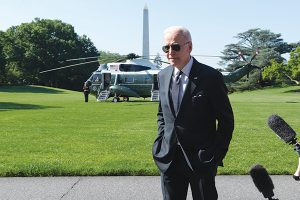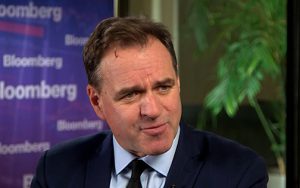Is detente still a dirty word? I hope not. We may soon need it.
Back in the 1970s, that little French duosyllable was almost synonymous with “Kissinger.†Despite turning 99 last month, the former secretary of state has not lost his ability to infuriate people on both the right and the left — witness the reaction to his suggestion at the World Economic Forum that “the dividing line [between Russia and Ukraine] should return to the status quo ante†because “pursuing the war beyond that point could turn it into a war not about the freedom of Ukraine … but into a war against Russia itself.â€
Nearly half a century ago, when he was in office, his efforts to achieve detente
with the Soviet Union were no less controversial. It is sometimes forgotten how much Ronald Reagan’s rise to prominence in national politics owed to his critique of detente as a policy and of Kissinger as a statesman.
Throughout the 1970s, Reagan’s radio broadcasts regularly taunted Kissinger for failing to save South Vietnam from Communism and acquiescing as the Soviet Union cynically exploited detente to extend its power.
In 1976 Reagan repeatedly pledged to fire Kissinger as secretary of state if
his campaign for the Republican nomination and the presidency were successful. “Under Messrs. Kissinger and Ford,†he declared in March of that year, “this nation has become number two in military power in a world where it is dangerous — if not fatal — to be second best. … Our nation is in danger. Peace does not come from weakness or from retreat. It comes from restoration of American military superiority.†In a televised speech, Reagan defined detente as “negotiat[ing] the most acceptable second-best position available.†The neoconservative Norman Podhoretz went further, accusing Kissinger of “making the world safe for Communism.â€
Few academic historians today are neocons. They are more likely to attack Kissinger from the left, for the slack he cut right-wing dictatorships in pursuit of his grand strategy. Yet they, too, have little positive to say about detente. A little like appeasement, which started life a respectable term in the diplomatic lexicon, detente is now disreputable.
And yet detente in the 1970s was not like appeasement in the 1930s: It successfully avoided a world war. The more I ponder that troubled, turbulent decade, the more I see detente as a smart solution to the mess the United States was in by the beginning of 1969, when Richard Nixon took up residence in the White House, with Kissinger down in the basement of the West Wing as his national security adviser.
Unable to win its war against North Vietnam, deeply divided over that and a host of other issues, the US was in no position to play hardball with the Soviet Union, as John Kennedy had and as Reagan would. Moreover, with a mounting inflation problem, the US economy was in no fit state to increase spending on defense.
The architect of detente had no illusions about the Soviets, whose cynicism and opportunism Kissinger understood only too well. Under Nixon and Gerald Ford, he pursued detente for two main reasons: to avoid World War III and to play for time, exploring the possibilities of an increasingly multipolar, interdependent world. And, as it turned out, that worked.
Detente could not deliver “peace with honour†in Vietnam. The interval between peace and conquest that it bought for South Vietnam was less than decent. Yet Armageddon was averted. And precious time was bought.
Emboldened, the Soviets mounted a series of ill-judged and costly interventions in what was then
called the Third World, culminating in Afghanistan in 1979.
Meanwhile, as my colleague Adrian Wooldridge has smartly pointed out, the US economy took advantage of America’s retreat from Cold War confrontation to innovate in ways that would leave the Soviets in the dust, creating the financial and technological resources that made Reagan’s (and George HW Bush’s) Cold War victory possible. Apple, Charles Schwab, Microsoft, Oracle, Visa — the list of world-beating companies founded in the 1970s speaks for itself. There is a lesson here.
In purely foreign-policy terms, the grand strategy of Joe Biden’s administration is open to criticism. “What began as an effort to make sure Russia did not have an easy victory over Ukraine,†wrote David Sanger and his New York Times colleagues, “shifted as soon as the Russian military began to make error after error, failing to take Kyiv. The administration now sees a chance to punish Russian aggression, weaken Mr Putin, shore up Nato and the trans-Atlantic alliance and send a message to China, too.†That is a well-grounded assessment, in line with
numerous statements by President Biden, Defense Secretary Lloyd Austin, the US ambassador to Nato, Julianne Smith, and other American officials.
But what exactly does Russian “strategic failure†look like? And how much assistance will the United States have to give Ukraine to achieve it? Newsweek alluded to “a report that stated the US was preparing to target the Russian fleet to free up paths for Ukraine to export grain.†That was almost certainly an incorrect inference from a tweet by a Ukrainian government adviser.
Still, some influential figures in and around Washington seem eager to ramp up American support for Ukraine in remarkable ways. Last month, my old friend James Stavridis wrote that “an escort system for Ukrainian (and other national) merchant ships that want to go in and out of Odesa†was “worth considering†by the US and its Nato allies. The Black Sea should become “the next major front in the Ukraine war.â€
—Bloomberg
Niall Ferguson is a Bloomberg Opinion columnist. The Milbank Family Senior Fellow at the Hoover Institution at Stanford University and the founder of Greenmantle, an advisory firm, he is author, most recently, of “Doom: The Politics of Catastropheâ€
 The Gulf Time Newspaper One of the finest business newspapers in the UAE brought to you by our professional writers and editors.
The Gulf Time Newspaper One of the finest business newspapers in the UAE brought to you by our professional writers and editors.

